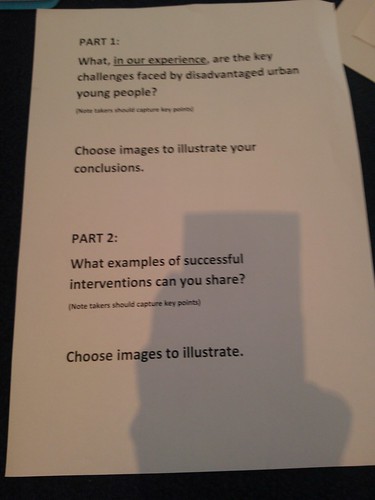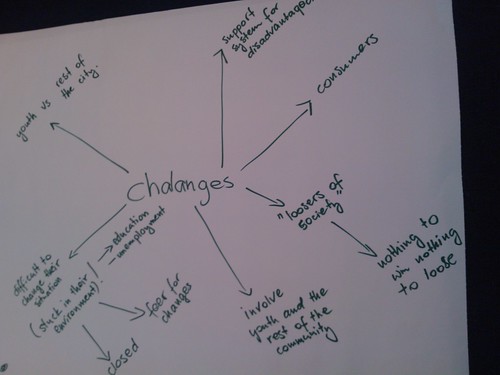Steve Lawson: Getting ready to start the first day proper of the Urban Solutions Seminar. Keep an eye out here for live updates and resources.
Wednesday May 30, 2012 8:58 Steve Lawson
Steve Lawson: Here's a recording of the introduction to the seminar, by Susie Nicodemi & Dan Smith:
Wednesday May 30, 2012 9:27 Steve Lawson
Ben Walker: I've uploaded some photos from yesterday's introductory session to Flickr. There's a slideshow on the Urban Solutions Seminar home page, which pulls photos from the UrbSol tag on Flickr.


Wednesday May 30, 2012 9:40 Ben Walker
Ben Walker: The aims of the seminar are to identify the challenges that face young people in cities, identify successful interventions and reflect on youth work.
Wednesday May 30, 2012 9:42 Ben Walker
Ben Walker: In the first session we're going to share what we want to have achieved by the end of this seminar.
Wednesday May 30, 2012 9:46 Ben Walker
Ben Walker: In the first session, we're going to share what we want to have achieved by the end of this seminar.
Wednesday May 30, 2012 9:47 Ben Walker
Steve Lawson: Tony Geudens from SALTO inclusion introduces their work at Urban Solutions -
Wednesday May 30, 2012 9:51 Steve Lawson
Steve Lawson: Dan Smith is exploring some of the themes in the Urban Youth Challenges Mindmap - it's embedded here. http://urbansolutions.posterous.com/urban-youth-challenges-a-mind-map - if you have any thoughts or observations about it, please post them in the comments on that page.
Wednesday May 30, 2012 11:00 Steve Lawson
SBS_II: what can we replace the clunky term 'disadvantaged urban young people' with? How best to describe the issue? #UrbSol
Wednesday May 30, 2012 11:08 SBS_II [via Twitter]
solobasssteve: @darkomarko I'm not sure - I'll ask around! #UrbSol
Wednesday May 30, 2012 11:08 solobasssteve [via Twitter]
SALTOdiversity: What do we understand by the term 'disadvantaged urban young people'? #UrbSol
Wednesday May 30, 2012 11:09 SALTOdiversity [via Twitter]
Steve Lawson: http://www.flickr.com/photos/solobasssteve/ - the questions being discussed just now
Wednesday May 30, 2012 11:23 Steve Lawson
Steve Lawson: Part 1 - what, in our experience, are the key challenges faced by disadvantaged urban young people?
Choose images to illustrate your conclusions.
part 2
what examples of successful interventions can you share?
Choose images to illustrate your conclusions.
part 2
what examples of successful interventions can you share?
Wednesday May 30, 2012 11:25 Steve Lawson
Steve Lawson: "we don't just need to change the youth, we need to change society - to move society towards them, not just the youth towards mainstream society"
Wednesday May 30, 2012 11:26 Steve Lawson
Ben Walker: Problems coming up in groups: young people's problems are often invisible in society, there can be little tolerance between young and old, most role models are negative (gangsters), young people are being excluded from public places...
Wednesday May 30, 2012 11:26 Ben Walker
Ben Walker: ...limited access to employment, limited access to education (including university fees), criminality, drugs, radicalism, low tolerance between races...
Wednesday May 30, 2012 11:28 Ben Walker
Steve Lawson: "young people in disadvantaged areas in france are also the most supported - in school, via youth initiatives... this is the paradox - there are a lot of means for them, but something is still failing - they stay as society's 'losers'. "
"you can put as many youth work resources in as you like, but there's still a lack of education and employment"
"you can put as many youth work resources in as you like, but there's still a lack of education and employment"
Wednesday May 30, 2012 11:31 Steve Lawson
11:38

What are the challenges to young people in cities in your experience?
Wednesday May 30, 2012 11:38
Steve Lawson: "there's a question of tempo in the challenges - young people need time to confront these challenges. Politics and political solutions take a very long time to implement, and is out of step with the tempo of the discussion..."
Wednesday May 30, 2012 11:41 Steve Lawson
Steve Lawson: "the focus on outcomes in order to get funding for a project can ruin the process - fulfilling criteria takes away valuable time from the real work"
Wednesday May 30, 2012 11:43 Steve Lawson
Steve Lawson: "the middle class sets the norm, and demands that those who are "disadvantaged" conform to those norms"
Wednesday May 30, 2012 11:56 Steve Lawson
Ben Walker:
Sharing success stories...
- Football teams were created for young boys, where they sign a contract, get a shirt and rewards and punishments are based on behaviour at school and on the street...
- A rock music teacher who teaches difficult children to play guitar is well respected...
- A recording studio gives children a chance to tell their stories in a hip hop style that they understand and respect...
- All the services children need (social workers, employment officers, education advisors, sports trainers) are brought into one building...
Wednesday May 30, 2012 11:59 Ben Walker
Steve Lawson: "the school system focuses on one form of intelligence, and ignores all the others"
Wednesday May 30, 2012 11:59 Steve Lawson
Ben Walker: Teenagers are treated better when accompanied by familiar street workers to interviews with police and in court...
Wednesday May 30, 2012 12:01 Ben Walker
Steve Lawson: Moving onto successful intervention stories...
"taking kids who struggle academically and giving them opportunities to explore language and communication in a more familiar medium, IE rap..."
"taking kids who struggle academically and giving them opportunities to explore language and communication in a more familiar medium, IE rap..."
Wednesday May 30, 2012 12:05 Steve Lawson
Ben Walker: Disabled children from around Europe were given art workshops and training to help them integrate into the cultural life of their cities...
Wednesday May 30, 2012 12:06 Ben Walker
Steve Lawson: "we do a lot of cooking, as a multi-cultural meeting point. The young women came to us to tell us what else they're good at - one woman said I'd love to be involved in a conversation and a debate about life, but not in cooking. we need to be careful not to stereotype."
Wednesday May 30, 2012 12:07 Steve Lawson
Steve Lawson: "we use music as a vehicle for moving the young people forward - we start with their interest in gangsta rap, but then book them a gig playing to older people and use that as a forum for writing about other topics"
Wednesday May 30, 2012 12:09 Steve Lawson
Steve Lawson: "in Warsaw there are are two parts of the city divided by the river. One side is v. disadvantaged. One artistic group created a project for youth in the disadvantaged area, and taught them circus skills - stilt-walking, juggling..."
Wednesday May 30, 2012 12:12 Steve Lawson
Steve Lawson: "we use dance, rap, singing... to set up gigs for the local community, and I try to give a platform to the kids to show the world what they are capable of. that can be a role for youth workers: to strengthen the community"
Wednesday May 30, 2012 12:13 Steve Lawson
Steve Lawson: "we had a problem with high rates of theft in our area, and the shops were stopping the young people from even entering the shops, so we found ways to get the young people jobs with local businesses, helping to address the unemployment issues that were at the heart of some of the crime problems"
Wednesday May 30, 2012 12:16 Steve Lawson
Guest: I agree with you. And Foundation who give money, usualy do not want to put money but for a long period of time. And we know that continuity in programs with young from disadvantage areas need long term projects - programmes. The policy of Donors have to be changed too.
Wednesday May 30, 2012 12:26 Guest
Guest: And best regards from Suzana Kaplanovic from Belgrade :)
Wednesday May 30, 2012 12:26 Guest
Steve Lawson: Thanks Suzana! Please feel free to post any other comments or to send longer thoughts to urbansolutions@posterous.com - that will become a blog post on the site here :)
Wednesday May 30, 2012 12:27 Steve Lawson
Guest: In Belgrade, in Serbia, in unhygienic Settlement Deponija, we provide support in learning for kids that go to school for 5 years now. How? We connect Faculty for social work, Red Cross, American Councile Alumny Comunity, and Roma families. Students provide tutorial support in learning in school, and students from 4. degree work with families of those children support them in accessing the social rights they have; American Councile provide volunteers to educate same children with English lessons and provide entertainment (cinema, picnics etc.); my organization Agenda provide every year workshop of Theatre of the oppressed with ALL students in school addresing non discrimination;
Wednesday May 30, 2012 12:32 Guest
Guest: So, for now, we are facing problems with proffesors in school, and donators :(
Wednesday May 30, 2012 12:32 Guest
SALTOdiversity: Different sectors need to work together and communicate to tackle the challenges young people face. #UrbSol
Wednesday May 30, 2012 12:39 SALTOdiversity [via Twitter]
Steve Lawson: feedback - "All in One House - we have a project where we put different kind of workers in one house - social workers, mental health workers, teachers, policy, employment officers - in the same house as the youngsters. When the young people come there, we don't need to send them elsewhere to get the help they need. We've had it for a year and we've had a very good response from the youngsters"
Wednesday May 30, 2012 12:48 Steve Lawson
Steve Lawson: discussing the changing role of police, and the various culturally defined understanding of the relationship between the police and the community - also highlighting the role of reality TV shows in 'humanising' the public opinion of the police, starting to see the police in some countries as 'problem solvers' rather than tyrants...
Wednesday May 30, 2012 12:54 Steve Lawson
Ben Walker: The term "disadvantaged" is problematic. How about "young people with fewer opportunities". Should we be classifying people at all, or should we provide services and let people classify their own problems?
Wednesday May 30, 2012 1:07 Ben Walker
Suzana Kaplanovic: I prefere to not puting people in any categorisation.... I prefer youngs who do not accessing their rights, or whose rights are violated.
Wednesday May 30, 2012 1:19 Suzana Kaplanovic
getamara: #UrbSol Proximity of the Police or Police of Proximity, what is in for young people, citizens and officials?
Wednesday May 30, 2012 2:05 getamara [via Twitter]
getamara: RT @SALTOdiversity: Different sectors need to work together and communicate to tackle the challenges young people face. #UrbSol
Wednesday May 30, 2012 2:06 getamara [via Twitter]

